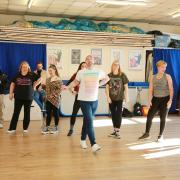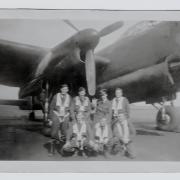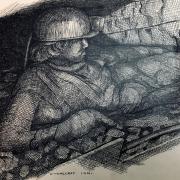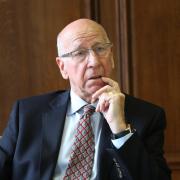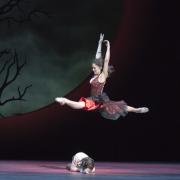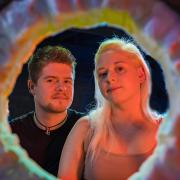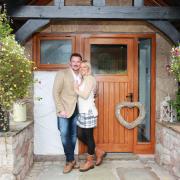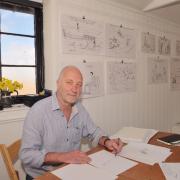Having spent a lifetime exploring the world’s most remote places, Benedict Allen is preparing for some journeys closer to home.

A young boy playing in the stream behind the family home in Prestbury looks up as the roar of a plane shatters the quiet. He takes a break from catching sticklebacks in jam jars and as he shields his eyes while the plane passes overhead, he sees the wings dip in turn. The boy smiles and waves back as his dad guides the mark two Vulcan bomber back to Woodford Aerodrome.
For most boys it would be a thrilling moment – for Benedict Allen it was a sign. ‘It seemed like he was giving me permission, saying ‘You can be a pioneer.’
And boy, has he pioneered.
Since his first expedition to the Amazon as a naive 23-year-old, he has visited remote and far-flung places across the globe, always immersing himself in the lives of the indigenous people. He is a Trustee of the Royal Geographical Society and has written books and recorded television programmes, usually alone and without a camera crew.
When he spoke to Cheshire Life, he was preparing to return to the Amazon to re-visit the native people he met on his first trip.
‘By the age of ten I definitely wanted to be an explorer,’ he said. ‘I think everyone is by inclination an explorer and that they want to find out about the world around them. I remember the moon landings and those astronauts were test pilots so that made me think they were at the cutting edge.
‘After school and university, I decided to give it a go. I had no money but thought I’d head off and see what happened. People go on gap years now and this was not much more than that. I went to the Amazon and was helped a lot by my naïveté.’
During the trip he travelled 600 miles on foot and by dug-out canoe but he added: ‘I survived, but so much went wrong. My parents very sweetly let me live at home to save some money and write a book about my trip. So many things had gone wrong that people wanted to read about it.
‘It helped me to come to terms with what I’d done and realise that it had me feel complete. I wanted to experience life in different cultures and to learn from local people. My mum did ask when I was going to get a proper job but they were always very supportive.
‘I am so grateful to my parents for letting me do what I wanted to do. They encouraged me and it was a lovely thing that they nurtured my dreams. It must have been painful for my mum; when my dad retired, I started.’
Despite his decades of exploration, books and television series, many people will have heard of Benedict for the first time late last year when he hit the headlines after apparently getting lost on an expedition to Papua New Guinea. When he re-appeared he had malaria and dengue fever and was airlifted out by a helicopter sent by the Daily Mail who claimed they had rescued him from certain death.
‘Rubbish,’ says Benedict. ‘I wasn’t lost at all. I had no phone and no GPS – I wanted to be the same as the locals. I trusted people and I wanted them to trust me. I was there to see people I’d seen 35 years earlier and when I’d seen my old pals I went to leave but I couldn’t quite get out because a war had started. I’m not a fighter so I hunkered down and waited, but unfortunately I contracted malaria and dengue fever.’
The headline in the Daily Telegraph read ‘Privileged fool or intrepid adventurer’ which brings a snort of laughter from Benedict. ‘There was a lot of rubbish written about me,’ he says.
‘Exploration is full of privilege, the privileged classes have made up the bulk of explorers. I suppose I have a rather posh accent and went to private school but that was because my gran had some money, we didn’t. There was nothing spare. I worked my way and I’ve never had a sponsor.’
He took a break from travelling after becoming separated from his dog team and sledge on a trip to the Arctic in 2000 but a decade or so later he made a TV programme with BBC security correspondent Frank Gardner.
‘While I was doing that I realised I had an extraordinary amount of knowledge and expertise and had turned my back on it. I thought I had a duty to the subject to put a case for explorers heading out there.’
Now a father of three children aged two, eight and ten, he said: ‘Family has changed things for me, I feel much more mortal and that makes me hesitate more than I did before. People viewed my dad as a risk taker, but test pilots are better prepared than anyone and I don’t view myself as a risk taker, I’m a challenge taker. I worry more about my children running into the road.
‘Children are taught that the world has been trashed and degraded and that exploration is a thing of the past but it’s entering a new era – it’s now about all of us. Children are learning more about the environment and the world than I ever did, and travel is so much more accessible now. We can all get out and be explorers and be curious about the world. And it has never been more important.’
He’ll be able to find out more about a part of the globe he’s less familiar with when he embarks on a theatre tour talking about his exploits. ‘Although the rainforest is like a walk in the park, I don’t know Britain very well so I’m looking forward to exploring a little closer to home.’






